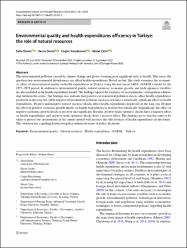| dc.contributor.author | Demir, Selin | |
| dc.contributor.author | Demir, Harun | |
| dc.contributor.author | Karaduman, Çağlar | |
| dc.contributor.author | Çetin, Murat | |
| dc.date.accessioned | 2023-04-20T08:01:13Z | |
| dc.date.available | 2023-04-20T08:01:13Z | |
| dc.date.issued | 2022 | |
| dc.identifier.issn | 0944-1344 | |
| dc.identifier.issn | 1614-7499 | |
| dc.identifier.uri | https://doi.org/10.1007/s11356-022-23187-2 | |
| dc.identifier.uri | https://hdl.handle.net/20.500.11776/10809 | |
| dc.description.abstract | The environmental pollution caused by climate change and global warming pose significant risks to health. This raises the question how environmental disturbances can affect health expenditures. Based on this, this study examines the asymmetric effect of environmental quality on health expenditures in Turkiye using the non-linear ARDL (NARDL) model for the 1975-2019 period. In addition to environmental quality, natural resources, economic growth, and trade openness variables are also included in the health expenditure model. The findings support the existence of an asymmetric cointegration relationship between the series. The findings also indicate that positive environmental pollution shocks affect health expenditures positively in the long run, while negative environmental pollution shocks do not have a statistically significant effect on health expenditures. Positive and negative natural resource shocks affect health expenditures negatively in the long run. Despite the effect of positive economic growth shocks on health expenditures is positive but statistically insignificant, the effect of negative economic growth shocks is positive and significant. Besides, positive trade openness shocks have a negative effect on health expenditures and negative trade openness shocks have a positive effect. The findings prove that the steps to be taken to protect the environment in the current period will increase the effectiveness of health expenditures in the future. This situation has a guiding feature for policy-makers in terms of policy decisions. | en_US |
| dc.language.iso | eng | en_US |
| dc.publisher | Springer Heidelberg | en_US |
| dc.identifier.doi | 10.1007/s11356-022-23187-2 | |
| dc.rights | info:eu-repo/semantics/openAccess | en_US |
| dc.subject | Environmental Quality | en_US |
| dc.subject | Natural Resources | en_US |
| dc.subject | Health Expenditures | en_US |
| dc.subject | Nardl | en_US |
| dc.subject | Turkiye | en_US |
| dc.subject | Co2 Emissions | en_US |
| dc.subject | Time-Series | en_US |
| dc.subject | Structural Breaks | en_US |
| dc.subject | Renewable Energy | en_US |
| dc.subject | Carbon Emissions | en_US |
| dc.subject | Unit-Root | en_US |
| dc.subject | Care | en_US |
| dc.subject | Globalization | en_US |
| dc.subject | Determinants | en_US |
| dc.subject | Growth | en_US |
| dc.title | Environmental quality and health expenditures efficiency in Turkiye: the role of natural resources | en_US |
| dc.type | article | en_US |
| dc.relation.ispartof | Environmental Science and Pollution Research | en_US |
| dc.department | Fakülteler, İktisadi ve İdari Bilimler Fakültesi, İktisat Bölümü | en_US |
| dc.authorid | Demir, Harun/0000-0001-7778-2897 | |
| dc.authorid | Saygin Demir, Selin/0000-0003-4617-3882 | |
| dc.institutionauthor | Çetin, Murat | |
| dc.institutionauthor | Demir, Selin | |
| dc.relation.publicationcategory | Makale - Uluslararası Hakemli Dergi - Kurum Öğretim Elemanı | en_US |
| dc.authorscopusid | 57912900000 | |
| dc.authorscopusid | 57219221304 | |
| dc.authorscopusid | 56705509800 | |
| dc.authorscopusid | 57217859668 | |
| dc.identifier.wos | WOS:000860427500009 | en_US |
| dc.identifier.scopus | 2-s2.0-85139174318 | en_US |
| dc.identifier.pmid | 36166119 | en_US |



















